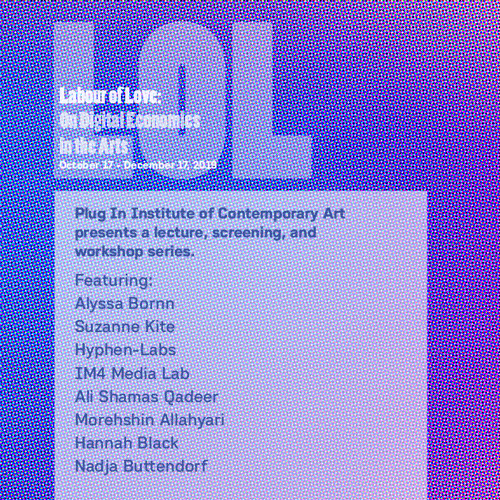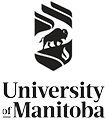Labour of Love: On Digital Economies in the Arts | October 17 – December 17, 2019
Plug In Institute of Contemporary Art | 1, 460 Portage Ave | Winnipeg MB | Canada
Plug In Institute of Contemporary Art presents Labour of Love or LOL, a series of lectures, screenings, and workshops focused on digital economies of labour in the arts. Taking on the “public course” as a platform for engagement, this program highlights the various ways in which the digital is interrogated, explored, celebrated, pushed to its limit, reworked, re-invented by artists, scholars, curators, writers and others. The course encompasses a full array of events, delving into such topics as coding, circuitbending, VR, AI and AR, gaming, scanning, and 3D printing. Divided into two streams, a lecture and screening series, and workshops, Labour of Love at its most general examines the relationship between the economics of labour and the digital arts as it contends with the conditions of racial capitalism. As a research platform, we aim to build an understanding of the digital by presenting artists who invent new trajectories through various technologies.
Associated Programming:
Labour of Love: On Digital Economies in the Arts
October 17 to December 17, 2019
Thursday, October 17 | 7pm
Screening: Videos by Hannah Black
October 17-November 17
Screening in Plug In’s Breezeway
More, Less, About the Same (2019)
By Alyssa Bornn
Thursday, November 7 | 7pm
Monday, November 18 | 8pm
Friday, November 22 | 6pm
Friday, November 22-23
Monday, December 2 | 7pm
Co-presentation with School of Art, Graphic Design, University of Manitoba
Monday, December 2-6
Thursday, December 5 | 7pm
Lecture by Morehshin Allahyari
Co-presentation with Institute for the Humanities, University of Manitoba
Tuesday, December 17 | 7pm
Keynote Address by Hannah Black
December 6, 2019 – March 6, 2020
Screening in Plug In’s Breezeway
Soft Nails ~ ♥[ASMR] Kleincomputer Robotron KC87 ♥
By Nadja Buttendorf
All lectures and screenings are free and open to the public.
Participant Bios:
Prominent artist, writer and critic, Hannah Black studied English Literature at Cambridge University before completing an MFA in Art Writing at Goldsmiths, University of London. She then participated in Whitney’s Independent Study program. Black has published two books, Life (2017), in collaboration with Juliana Huxtable, and Dark Pool Party (2016). Along with Ciarán Finlayson, and Tobi Haslett, Black was the co-author of the seminal article in Artforum, “The Teargas Biennial.” She has screened and shown in exhibitions across Europe and the United States most recently at Göteborg International Biennial for Contemporary Art; Sharjah Biennial 14; Performance Space New York; Real Fine Arts, New York; Centre D’Art Contemporain, Geneva; Chisenhale Gallery, London UK; mumok, Vienna; Arcadia Missa, Paris; and New Museum Theatre, New York.
Kite aka Suzanne Kite is an Oglala Lakota performance artist, visual artist, and composer raised in Southern California, with a BFA from CalArts in music composition, an MFA from Bard College’s Milton Avery Graduate School, and is a PhD candidate at Concordia University. Currently she is a 2019 Pierre Elliott Trudeau Foundation Scholar and a Research Assistant for the Initiative for Indigenous Futures. Her research is concerned with contemporary Lakota epistemologies through research-creation, computational media, and performance practice. Recently, Kite has been developing a body interface for movement performances, carbon fiber sculptures, immersive video & sound installations, as well as co-running the experimental electronic imprint, Unheard Records.
Hyphen-Labs is an international collective working at the intersection of technology, art, science, and the future. Through their global vision and multi-disciplinary backgrounds they are driven to create engaging ways to explore planetary-centered design. In the process they challenge conventions and stimulate conversations, placing collective needs and experiences at the center of evolving narratives.
IM4 Media Lab: Envisioned and developed by Indigenous filmmaker Loretta Todd, the Indigenous Matriarch 4 Lab is a collaboration with Emily Carr University of Art and Design and Indigenous media professionals, including Doreen Manuel, Cease Wyss, and Tracey Kim Bonneau. The IM4 Lab is designed to build an ecosystem of Indigenous VR/AR/360 developers, technicians, storytellers, media professionals and artists to participate in and influence the growth of Virtual and Augmented Reality (VR/AR/360).
Ali Shamas Qadeer is a designer and educator based in Toronto. He works in web, print, and web and print. After completing a BA in philosophy and religious studies at McGill University, he developed an independent design practice in New York City before returning to school to complete an MFA at the Rhode Island School of Design in 2014. His work focuses on algorithmic formmaking, unorthodox toolmaking, and the disciplinary and economic structures that design practices buttress. After returning to Canada in 2014, Ali joined the faculty of OCADU where he is an Assistant Professor in the graphic and industrial design programs. In his teaching practice, Ali champions a critical approach that always refracts through a practice of formalism and making.
Morehshin Allahyari (b. 1985 in Tehran, Iran) is a media artist, activist, educator, and curator who uses computer modeling, 3D scanning and digital fabrication techniques to explore the intersection of art and activism. Inspired by concepts of collective archiving, memory, and cultural contradiction, Allahyari’s 3D printed sculptures and videos challenge social and gender norms. She is developing a new body of work on digital colonialism and ‘re-figuring’ as a feminist and decolonialist practice, titled She Who Sees the Unknown. Researching female monsters, jinn and dark goddesses of Middle-Eastern origin, Allahyari devises narratives through practices of magic and poetic-speculative storytelling, re-appropriation of traditional mythologies, collaging, meshing, scanning, and archiving.
Alyssa Bornn is an interdisciplinary artist, filmmaker, and organizer based in Winnipeg, MB. Her practice regularly utilizes traditional photographic methods alongside alternative and outdated digital modes of image capture. In particular her work is centred on ideas relating to transference, interchangeability, medium non-specificity, language, failure, and the poetics of technical processes. She holds a BFA from the University of Manitoba and is a member of Open City Cinema, the co-director of the Winnipeg Underground Film Festival, and an active member in Light Terrors – a loose collective showcasing moving image and audio works as live performance. She has run workshops for Platform Centre for Photographic + Digital Arts, PAVED Arts, and independently as Professional Development.
Nadja Buttendorf (b.1984) questions current norms and codes of gender constructions and value creation mechanisms of the human body in our digital society. Her works make it clear that our understanding of technology is also linked to patriarchal power relations. Her interactive works and video projects, on the other hand, draw multi-layered new narratives in which women are visible as an elementary part of the history of technology. She extracts communicative moments of participation in the internet both in her performative jewellery objects and in her tutorial workshops. DIY, as a widespread online aesthetic, is used specifically as a strategy of access and rejection of neoliberal work ethics. Works and workshops by Nadja Buttendorf have been shown at the HKW, Berlin; the Hartware MedienKunstVerein, Dortmund; Künstlerhaus, Bremen; LaGaîtéLyrique, Paris; the MU Eindhoven; the NRW-Forum, Düsseldorf; Halle 14 – Zentrum für zeitgenössische Kunst, Leipzig; the D21, Leipzig; and the panke.gallery, Berlin. She has also given lecture-performances at Re:publica, the CCC, Creamcake and the nGbK in Berlin. Buttendorf is a trained goldsmith and studied fine arts at the Burg Giebichenstein Kunsthochschule Halle (Saale).
This program is made possible through the Digital Strategy Fund: Digital and Intelligence by the Canada Council for the Arts
Acknowledgements
Plug In Institute of Contemporary Art recognizes we are in the territories of the Anishinaabeg, Cree, Dakota, Dene, Métis, and Oji-Cree Nations. Plug In ICA is situated in Treaty 1 territory, the ancestral and traditional homeland of Anishinaabe peoples. Treaty 1, was signed in 1871, taking this territory from seven local Anishinaabe First Nations in order to make the land available for settler use and ownership. (referenced from the University of Winnipeg)
Plug In ICA extends our heartfelt gratitude to our generous donors, valued members, and dedicated volunteers. We acknowledge the sustaining support of our Director’s Circle. You all make a difference.
We gratefully acknowledge the support of the Canada Council, the Manitoba Arts Council and Winnipeg Arts Council. We could not operate without their continued financial investment and lobbying efforts.
Plug In ICA relies on community support to remain free and accessible to all, and enable us to continue to present excellent programs. Please consider becoming a member of Plug In ICA and a donor at https://plugin.org/support or by contacting Angela Forget: angela@plugin.org
For more information on this and our other education programs, contact Nasrin Himada at nasrin@plugin.org
For general information, please contact: info@plugin.org or call 1.204.942.1043
Plug In Institute of Contemporary Art, Unit 1, 460 Portage Ave, Winnipeg, MB, Canada
info@plugin.org • plugin.org • 1.204.942.1043




